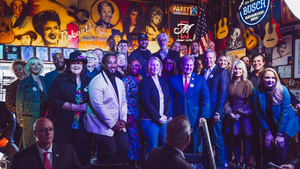Tennessee yesterday signed into law the Ensuring Likeness Voice And Image Security Act which extends publicity rights in the US state in the context of generative AI, deep fakes and voice clones.
The law was only proposed in January, but was sped through with bipartisan support, partly because of how rapidly generative AI tools are developing, and partly because once you've come up with a name for your legislation that spells out ELVIS Act, you gotta get that on the statute book, right?
“From Beale Street to Broadway, to Bristol and beyond, Tennessee is known for our rich artistic heritage that tells the story of our great state”, Governor Bill Lee declared as the ELVIS Act became law. “As the technology landscape evolves with artificial intelligence, I thank the General Assembly for its partnership in creating legal protection for our best-in-class artists and songwriters".
The new law has widespread support from the music industry. Recording Academy boss Harvey Mason Jr said yesterday that his organisation, "celebrates the passage of the ELVIS Act as a groundbreaking achievement in the effort to protect human creators in the age of AI".
"Today is just the beginning", he added, "as AI continues to develop, the Recording Academy and our members will continue to support meaningful legislation across the country that uplifts music people and human creativity".
The use of generative AI to clone a performer's vocals - or otherwise exploit an artist's likeness - has prompted much debate as to how any one person can stop the unauthorised use of their voice or likeness in that way.
Copyright law may help to an extent, in that an AI model will likely need to be trained using copyright protected content featuring the person. But the copyright obligations of AI companies are still being tested in court, plus a person may not own the copyright in a recording, film or photo that contains their voice or image.
That has put the spotlight on publicity or personality rights, which allow people to control use of their image or likeness, possibly including their voice. In the US, publicity rights sit in state law, meaning exactly how they work varies from state to state.
The ELVIS Act amends and extends the previous publicity right in Tennessee, which was last updated in 1984 in part to provide more protection for the estate of a certain Elvis Presley.
Even after the changes in the 1980s, the Tennessee publicity right mainly related to the use of someone's image or likeness in advertising. The ELVIS Act widens the reach of the right and also explicitly includes protection of a person's voice.
There are also proposals in Washington to introduce a US-wide publicity right in response to deep fakes and voice clones, with the No AI FRAUD Act in the House Of Representatives and NO FAKES Act in the Senate.
In the UK - where there is currently no publicity right - music industry groups have called on the government to consider how such protections could be introduced.
Meanwhile, record industry trade group BPI has threatened legal action against Voicify, a platform that facilitates unapproved voice cloning. Though that litigation, if it goes ahead, will likely primarily focus on copyright infringement.

